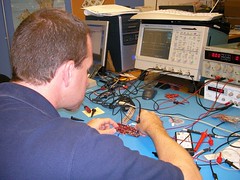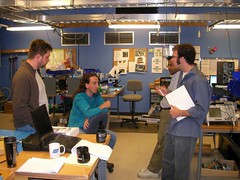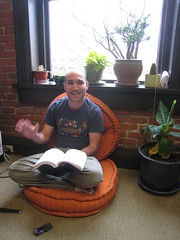Axe EXBIBLIOSO, or give it some love
March 26th, 2007 by Editor
by Jeff Bowman
Over the past two weeks I have been trying to get my arms around our brand strategy and trademarks. Several aspects of our current approach concern me. First of these is the name and word treatment of the company name: Exbiblio. What the name implies is “formerly a library of books,” or “out of the book.” This is clever enough. Exbiblio, however, is a tongue twisting four syllables so it only works as a company name; not as a product or services brand name to be featured in our communications with consumers. More troubling are the font, color palette and logo as outlined in our style guide. THEY ALL SCREAM GOTHIC . In fact, our font choice is even called Gothic. Our tagline (The Paper Renaissance) doesn’t make any connection with the digital world. Amusingly, it is even more of a disconnect when you consider that the Renaissance included the decline of Gothic architecture.
Visit to Synapse
October 4th, 2006 by Hugh
 Adam has posted an email from Brian (pictured left), an electrical engineer at Synapse, the consultants working for Exbiblio on its first product, the oPen (pocket scanner). Adam mentions hitting some “challenges” . Over here in England, we still call those “problems”, but you can get a sharp rebuke for uttering that word around Exbiblio.
Adam has posted an email from Brian (pictured left), an electrical engineer at Synapse, the consultants working for Exbiblio on its first product, the oPen (pocket scanner). Adam mentions hitting some “challenges” . Over here in England, we still call those “problems”, but you can get a sharp rebuke for uttering that word around Exbiblio.
Exbiblio, once again, is to be commended on its openness – but on this occasion, Synapse deserves credit too. As it happens, I was planning to write an account of my visit to Synapse.
Synapse is based in a former tram depot in a suburb of Seattle. Immediately I walk in, I get a different feel from Exbiblio – it’s open-plan, chatty, but business-like. The depot makes me think of the Google Garage. It has some of the make-shift romance of a start-up, though Synapse was founded in 2001 and employs around 40 people. Exbiblio, as I have mentioned before, is in the center of town, and has a bookish, intellectual feel, with the workers dispersed in offices along corridors, where they beaver feverishly away at their projects.
On its website, Synapse says it does technology- intensive product development. Since June, it has been working with Exbiblio to develop the oPen. Its other clients come from all over the world and include Microsoft, Samsung, Philips, Intel, Logitech, General Electric – well you name it.
 The five-strong engineering team working on the oPen is managed by Dave Zucker (holding the notepad in the picture). You will often see Dave and other Synapse people around Exbiblio. Exbiblio’s Ian MacDuff (in the middle of the picture) is often at Synapse. It all seems very well integrated. They seem like a happy team, though I hope Ian won’t mind me saying that he looks a little stressed now that the project is behind its ambitious schedule.
The five-strong engineering team working on the oPen is managed by Dave Zucker (holding the notepad in the picture). You will often see Dave and other Synapse people around Exbiblio. Exbiblio’s Ian MacDuff (in the middle of the picture) is often at Synapse. It all seems very well integrated. They seem like a happy team, though I hope Ian won’t mind me saying that he looks a little stressed now that the project is behind its ambitious schedule.
I’ve heard Dave say a couple of times that the Synapse way is to “fail early, and fail often” – in other words to go all out for rapid development of prototypes, see what works, what doesn’t, and then quickly do another one, and then, if necessary, another one.
That is what has NOT happened with the oPen. Dave told me:
“We had said at the beginning that this was a two month project.”
I interject, “Was that possible?”
“It was possible. But Martin and I had discussions along the way where we made conscious decisions to push out the schedule in return for something – either we learned more, or got a design that we liked better. When you shoot for a prototype in two months, you definitely are going to make some compromises. You certainly couldn’t design something for production that was exactly for final version in two months.”
And so the deadline slipped, partly as a trade-off for more features and knowledge, and partly just because it slipped a bit.
The first prototype – videoed last week – is about one and a half times bigger than the desired size of the final version (this was planned). The idea of this prototype is to learn about memory, processor, and battery-life requirements. The engineers are also looking for ways to cut the size down.
 Dave told me about one of the problems – er, challenges – already uncovered. When the first circuit boards came back from the factory they noticed some funny behaviour. Some diagnostics showed that two pins on the layout had been connected by a mistake in the design. It sounded as if this could be fixed quite easily.
Dave told me about one of the problems – er, challenges – already uncovered. When the first circuit boards came back from the factory they noticed some funny behaviour. Some diagnostics showed that two pins on the layout had been connected by a mistake in the design. It sounded as if this could be fixed quite easily.
I don’t really understand all the technicalities of Brian’s email but it doesn’t sound like the end of the world to me. I’m sure these glitches can be put right. But as we used to say back in my school days, Tempus Fugit.
It would have been nice to have a perfect prototype first time, but I think we all live in the real world and realise that “right first time” would require a lot of good fortune. It’s not really what Synapse promise (“Fail early and fail often”).
Tactless as ever, I asked Dave who pays for any delays. The answer is Exbiblio.
Shy of Consumerism
September 29th, 2006 by Hugh
One of the many unusual attributes of Exbiblio that struck me on my recent visit to Seattle, is that this company is truly averse to anything that smacks of consumerism. This is quite unusual for business that is about to offer up a product to the public.
While talking to Ed Mahlum and Martin King about marketing the Exbiblio oPen, I asked how they were gong to “position” it in the market. Martin winced. He doesn’t like the connotations of the word – nor any of the usual marketing spiel. The Exbiblio philosophy is that if the product turns out to be great, and if it can secure a place in people’s every day lives, then the sales will come right in the end.
I would agree that much of the language of business is lazy, and that the meaning is often unclear. Business lingo is mostly about making the speaker sound savvy. On further questioning, Ed and Martin say that there will be an initial target market (students), an initial price (around $99), and that it will be necessary to emphasize some of the potential uses of the oPen, of which there are many to choose from.
Website Design Review
September 1st, 2006 by Team Member
Earlier today I presented my preliminary design proposal to a group of Exbiblio team members including Ania, Martin, Jesse, Ed Tang, Ed Mahlum, Adam, and Hugh. The meeting was held as a review point at the boundary between the planning and development portions of the redesign effort. When it comes to building things, I’m of the “measure twice, cut once” mindset. Careful planning and consideration does much to prevent having to do the whole thing over again.
On the other hand, change is the only constant, and a web development effort should plan for change so that the redesign effort results in a scalable solution. As Peter Morville put it, we can avoid “The Infinite Loop of Destructive Creation” by seeing a web effort as a program rather than a project (for more of Peter’s thoughts on this topic, see his article entitled The Speed of Information Architecture).  This is a sentiment that was echoed during the meeting today, as we stand poised at the transition to product launch, creating a need for growth in web-based user support.
This is a sentiment that was echoed during the meeting today, as we stand poised at the transition to product launch, creating a need for growth in web-based user support.
The group generated some excellent structural suggestions that will be considered in the final site design, proposing changes to navigation elements and reinforcing the need for fresh content at regular intervals. But what struck me most were the deeper levels of thought. A major topic of conversation was how we will use the site to not only communicate from the company, but to also encourage participation and communication into the company. I think it’s rather unique that we are not only are we talking about citizenship, but we’re also actively looking for ways that we enact and cocreate citizenship with our users.
All in all, I thought it was a highly successful review. Thanks go out to the participants for their focus and attention during the meeting. On to processing everything we’ve discussed into a final design proposal!
By Ariel van Spronsen
Website Redesign
August 21st, 2006 by Team Member

This is a re-post of a blog entry I made to my internal blog on August 18. Internal blogs are one of the ways we communicate process and progress with one another at Exbiblio, and I thought I’d share it on our main blog as well since it’s about a process that many other small companies face at some point or another. So, without further ado, the post. — Ariel
What’s happening in my world (long)
Perhaps it’s hubris to think so, but maybe there are one or two folks out there who wonder what the heck happens on my side of the office every day. Well, among a couple of other smaller projects, I spend the majority of my time working on the website redesign.
Traditionally, web presences for small companies have been built as an afterthought. Many of these entities don’t want to devote time and resources toward building what is seen as simply a static brochure, so a site is launched with no planning or concern for the needs of its audiences; the goal is to just have a web footprint. I’m sure each and every one of us has been directed toward a company’s site hoping to learn more about it, only to find vague text and a directive to call the company for more information. How many of us pick up the phone?





